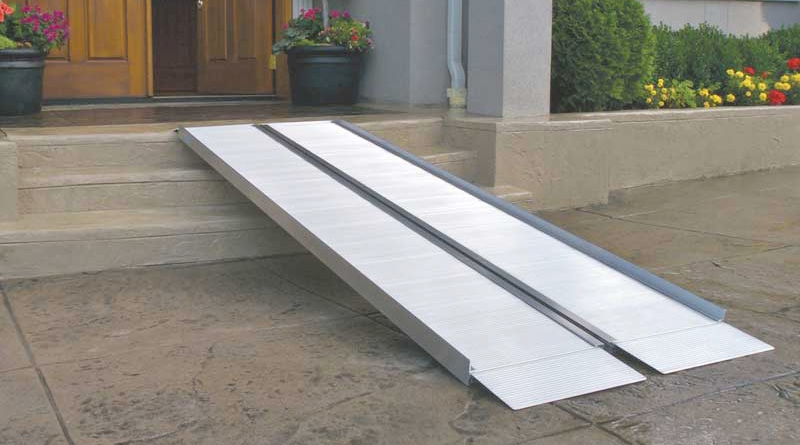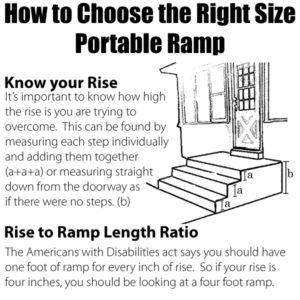“What length ramp should I order for 3 stairs?”
It’s the first question you should ask when purchasing a wheelchair ramp. But how exactly do you know which ramp or ramp length would be best for your stairs?
Here’s how HandiRamp’s CEO and resident ramp expert, Thom, responded;
“This is not a simple answer. Each stair typically runs about 7.5 inches high, so for three stairs a standard rise or height would be about 22 inches. The ADA [Americans with Disabilities Act] recommends one foot of ramp for every one inch of rise. Assuming your stairs are a standard height, this means an ADA-compliant ramp would be a whopping 22 feet long!
That’s a very long ramp and for most residential situations, prohibitive in terms of size and often cost. In a home setting, a shorter ramp using a one foot of ramp for every 2 inches of rise, which translates into a 12ft portable ramp, will often suffice both in terms of safety and effectiveness.
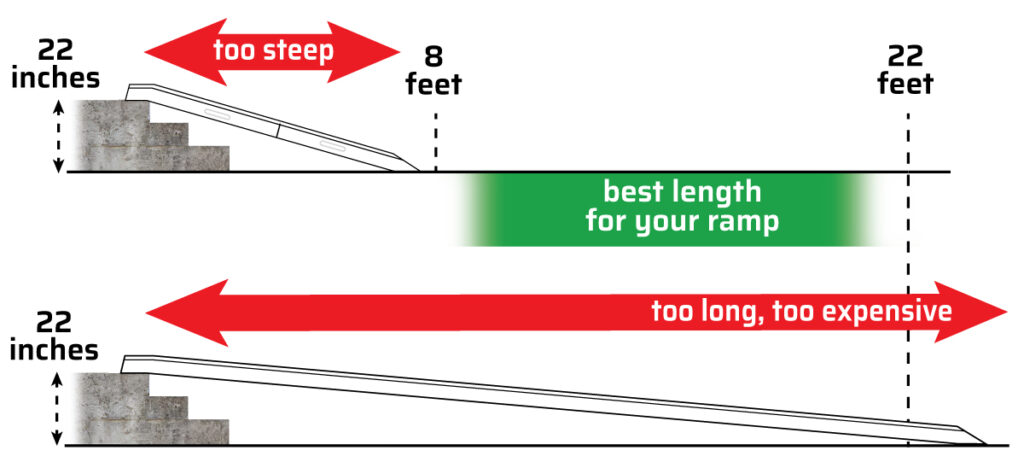
Other factors that should be considered include the weight of the wheelchair and the person in it, the strength of the person assisting if it is a manual chair, or the power of the wheelchair if it is a power chair.”
Let’s break this down a bit more.
Understanding the Importance of Ramp Length
The length of a wheelchair ramp directly correlates with the slope or incline, which significantly impacts usability and safety. A ramp that is too steep can pose significant risks for those using a wheelchair or mobility device instead of creating an accessible entrance. On the other hand, a ramp that is excessively long may be impractical or cumbersome, especially in residential settings. Therefore, striking the right balance is crucial, and it begins with accurately assessing the rise or height of the stairs.
Calculating Ramp Length Based on Stair Rise
As Thom explained earlier, each stair has a standard height of approximately 7.5 inches. While this is a general measurement, it’s still important to measure your stairs to get the exact rise. Once you have that rise measurement in hand, you can use it to calculate how long the ramp should be in order to adhere to ADA standards. As explored earlier, there should be one foot of ramp for every inch of rise. So if the rise of your stairs is 14 inches, the ADA ramp would be 14 feet long.
However, as aforementioned, a residential ADA ramp might not always be the most effective solution for your loved ones and home. With a 14-inch rise, a 7-foot-long ramp may be just as effective for your stairs with a slope that is a bit steeper than ADA.
In the next section, we will explore the other factors that influence ramp length selection as well as how to select the ramp that will work best for your application.
Factors Influencing Ramp Selection
Beyond the length calculations for your stairs, several other factors influence the choice of ramp type and length. These include:
- Weight Capacity: Consider the combined weight of the wheelchair and its occupant, as well as any additional equipment or supplies being transported. It is crucial to ensure that the type of ramp you choose is able to safely support this weight.
- Assistance Available: Determine whether the individual using the ramp will require assistance when using the ramp. For example, a ramp with a very gentle slope will be much easier for someone in a wheelchair to use without assistance than a steeper one.
- Usage Frequency: Assess how frequently the ramp will be deployed and whether a permanent or temporary solution is more suitable.
- Environmental Conditions: Take into account weather conditions, terrain, and any potential obstacles that may affect ramp usage. For example, would there be enough room in front of your entrance to accommodate a long, ADA-compliant ramp?
Choosing the Right Ramp Length & Type
Depending on the specific requirements and constraints of the situation, different types of ramps may be suitable:

Custom Aluminum Ramp
The most intensive (and expensive) option is to work with one of HandiRamp’s product experts to have a custom ramp designed and fabricated for your home. Using the measurements of your stairs and surrounding area, the ramp will be designed to fit your space with an ADA-compliant slope, which is exceedingly gentle. Whether you have 1 stair or 4, you can be sure that your ramp will never be too steep and will accommodate any wheelchair or mobility device.
While these ramps are technically not permanent because they can be disassembled and moved, they are more permanent than the other two ramp options and many clients have them installed and then never moved again.
Ideal for:
- Any rise, from one stair to multiple
- Very gentle slope
- More permanent usage, but can be moved
- Larger budgets
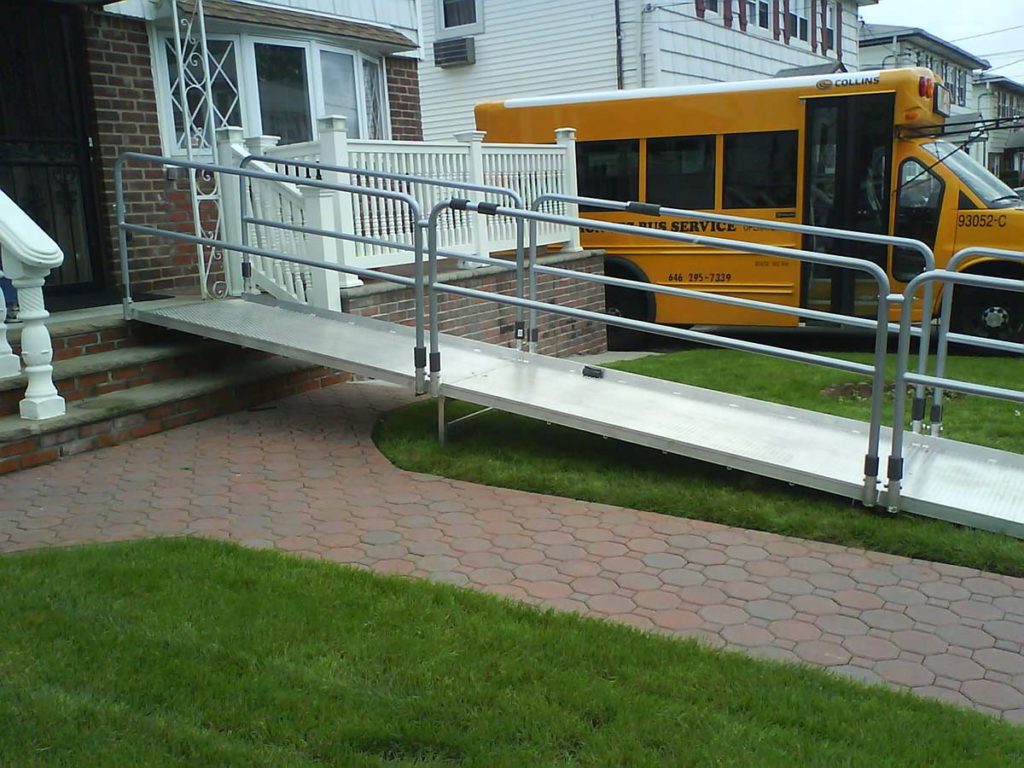
Semi-Permanent Modular Ramp
Our semi-permanent modular ramps offer a versatile and practical solution for accessibility needs, blending the stability of permanent installations with the flexibility of temporary setups. These ramps are designed to be easily assembled, disassembled, and reconfigured, making them an ideal choice for both short-term and long-term applications. Constructed from durable aluminum, these modular ramps provide a robust and reliable option that can withstand various weather conditions and heavy usage while requiring minimal maintenance.
Available in 12, 14, 16, 18, and 20-foot lengths, these modular ramps are ideal for a range of rises. While the slope may not always be as gentle as a custom ADA-compliant ramp depending on the rise, it can still be quite gentle when used on 1-4 stairs for residential access. Keep in mind that depending on the slope, some individuals may require assistance when using the ramp. Ideal for:
- 1-5 stairs or 36” in total rise
- Semi-permanent applications
- Gentle slope, but not always ADA-compliant
- DIY installation
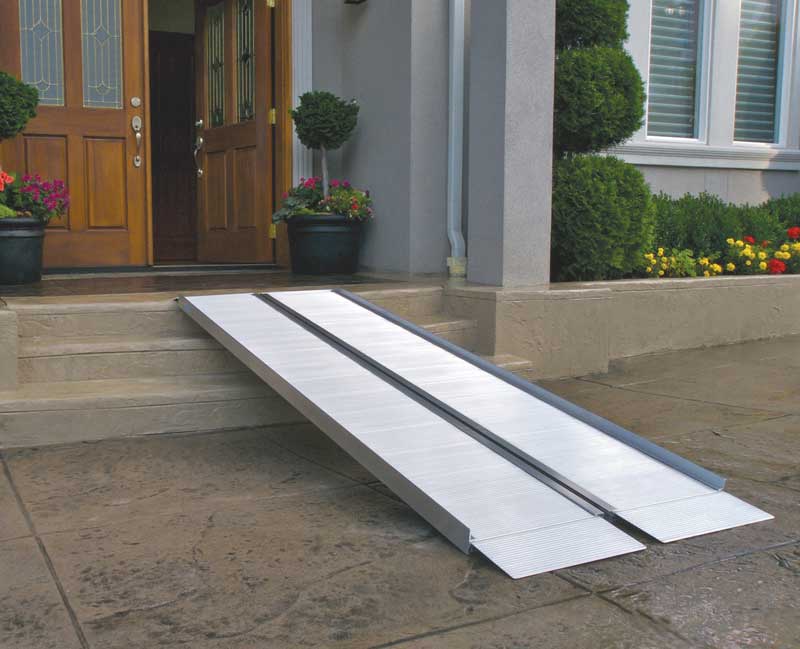
Portable Folding Ramp
The least permanent and most portable of the ramp options is the portable folding ramp. These ramps are ideal for use with steps, curbs, and thresholds, making them perfect for temporary or travel-related needs. Constructed from lightweight yet durable aluminum, HandiRamp’s portable folding ramps are easy to carry, set up, and store, ensuring that they can be quickly deployed whenever and wherever accessibility is required. The foldable design not only enhances portability but also allows for compact storage, making these ramps an excellent choice for use with vehicles, public transportation, or while visiting locations that lack permanent accessibility features.
Available in 5, 6, 7, 8, 9, 10, and 12-foot lengths, folding ramps are best suited for shorter rises, like one or two stairs. While they are extremely portable, these ramps can also accommodate handrails so that they can be used in one location more long-term.
Ideal for:- 1-3 stairs or 21” in total rise
- Use on the go
- Curbs and thresholds
- Quick and easy setup
Selecting the Best Ramp for Your Stairs with HandiRamp
Choosing the right ramp for navigating a specific number of steps involves careful consideration of various factors, including the intended use, installation environment, and budget. Custom ADA-compliant ramps offer a tailored solution that ensures maximum safety and accessibility, particularly for permanent installations where adherence to regulatory standards is paramount. These ramps, crafted to meet precise specifications, provide a seamless and durable solution for both residential and commercial properties.
For those requiring a balance between stability and flexibility, semi-permanent modular ramps present an excellent option. Their modular nature allows for easy assembly, reconfiguration, and customization to suit changing needs, making them ideal for situations where long-term but not permanent solutions are desired.
On the other hand, portable folding ramps are perfect for those who need a temporary, versatile solution that can be easily transported and deployed as needed. These ramps are particularly useful for short-term access needs or for individuals who require a ramp in multiple locations.
Ultimately, the right ramp for your needs will depend on the specific requirements of your environment, the frequency and nature of use, and budget considerations. Our team of ramp experts can help you evaluate all these factors to select the best ramp for you. Just give us a call at 800-876-7267!
Thom Disch
Award-winning author Thom Disch is owner and CEO of Handi Products that sells a variety of accessibility, commercial, and home products creating a safer environment for their customers. Thom is a leading expert and speaker on slip, trip, and fall injuries in the United States and has been compiling statistics and stories related to this healthcare crisis for ten years. Thom is also a serial entrepreneur and owns several companies and nationally known brands, including Handi-Ramp (handiramp.com), PetSTEP International (Petstep.com), and Industrial Toolz, Inc. (Industrialtoolz.com).


